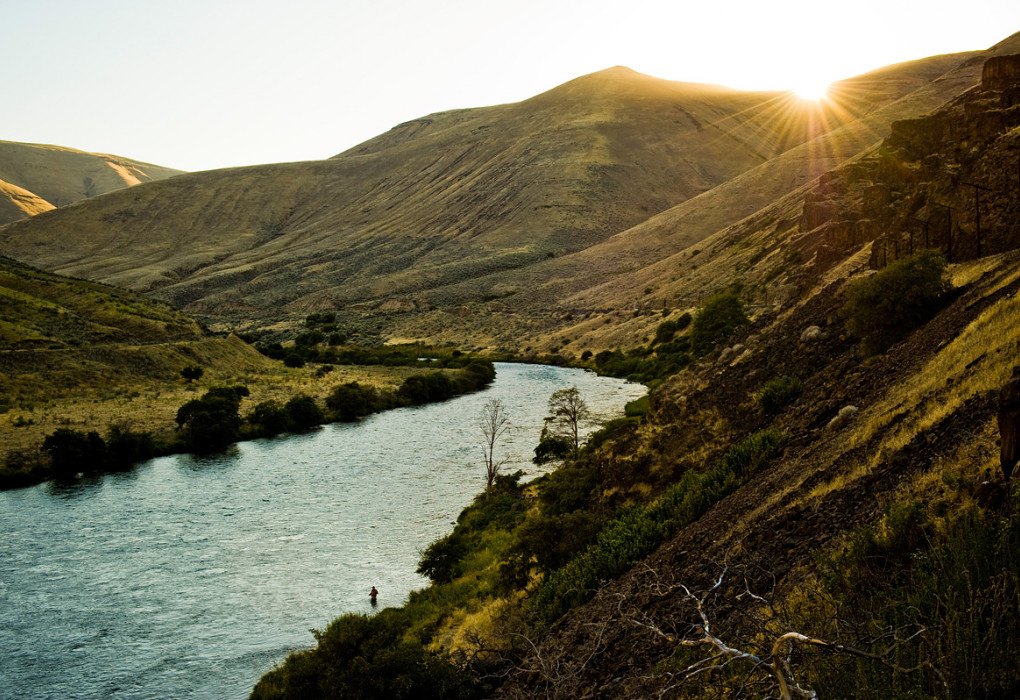Governor Brown: Let's Improve Water Quality on the Lower Deschutes River
Biologically Based Water Quality Standards Essential for the Lower Deschutes River
In August I had an opportunity to visit with Governor Kate Brown regarding a number of challenges and opportunities facing rivers and native fish across the state of Oregon. A chief issue was the growing public concern regarding water quality and native fish health on the lower Deschutes River. As a result of our conversation, the Governor requested a letter articulating our concerns and a path to resolving the challenges facing the lower Deschutes River.
After meeting with stakeholders and the Governor's Natural Resources staff this past week, the Native Fish Society submitting the following letter to the Governor's office along with American Rivers and Trout Unlimited. We look forward to working with the Governor, the Department of Environmental Quality, the Oregon Department of Fish and Wildlife to ensure that water quality below Portland General Electric's Pelton Round Butte Hydropower Project meets Clean Water Act standards critical for native fish and wildlife.
November 30, 2017
The Honorable Governor Kate Brown
Office of the Governor
900 Court Street NE, Suite 254
Salem, OR 97301-4047
Dear Governor Brown,
The undersigned organizations and our 11,000 supporters across the State of Oregon are writing to seek your support for improving water quality and conditions for native fish in the lower Deschutes River. Specifically, we seek your support for ensuring that water quality standards are met and sufficiently protective under the Water Quality Certification for the Pelton-Round Butte Hydroelectric Project (Project) on the lower Deschutes River pursuant to section 401 of the Clean Water Act.[1] Since 2011, the Project has been operated under a series of annual interim water quality agreements that have modified, and in some cases relaxed, many of the standards contained in the original 2005 Water Quality Certification for the Project without an opportunity for full and transparent public participation as required by Oregon law.[2]
The use of interim agreements for such an extended period is inappropriate. To the extent that the best available scientific information supports a modification to the 2005 Water Quality Certification, we request that you initiate a public process to formally amend[3] the Water Quality Certification for the Project pursuant to section 401 of the Clean Water Act.[4] Otherwise, we request that the Project be operated to meet the terms of the 2005 Water Quality Certification.
We also request that the Oregon Department of Environmental Quality work with the Oregon Department of Fish and Wildlife to ensure that the applicable standards are adequately and legally protective of salmon, steelhead, rainbow, and bull trout as required under Oregon statute.[5] The state water quality standards require protections for salmon, steelhead, rainbow and bull trout during critical periods of their life cycle, mainly spawning, egg incubation and fry emergence. The interim agreement requirements for some water quality standards, such as dissolved oxygen, rely on maps referenced in the Oregon Administrative Rules for salmon and steelhead spawning use designations for the lower Deschutes River, but do not also include actual active spawning activity by resident rainbow trout which is also required under the Oregon Administrative Rules.[6]
Our organizations are signatories to the Pelton-Round Butte Relicensing Settlement Agreement[7] (license) and are participants in a stakeholder group established under the terms of the license, the Fish Committee. We remain committed to working with Portland General Electric (PGE) and the Confederated Tribes of the Warm Springs and state and federal agencies to achieve the stated conservation goals of the license, the improvement of water quality in the lower Deschutes River and the reintroduction of self-sustaining wild salmon and steelhead above the Project. Key to achieving these objectives and building broad public support for the Project’s ambitious goals, is ensuring that Project management decisions and the criteria that guide them are based on the best available scientific information. To protect the ecological integrity of the lower Deschutes River and the credibility of the Project as a whole, it is imperative that the water quality standards that will guide this Project over the next 30 to 40-year period are developed in a transparent, and scientifically defensible manner.
The lower Deschutes River is one of Oregon’s treasured ecological and recreational jewels and the State of Oregon has been a leader in its conservation. The lower Deschutes, which was designated as a Wild & Scenic River in 1988, is home to outstanding fish and wildlife populations and provides cultural values, breathtaking views and world-class recreation, such as angling for salmon, steelhead and famed Redside rainbow trout, whitewater rafting, and camping. Today, state and federal agencies are required by law to protect and enhance the values of the river and its water quality under section 401 of the Clean Water Act.[8]
We would appreciate the opportunity to discuss this issue further with you or your staff.
Sincerely,
David Moryc
Senior Director
American Rivers
Mark Sherwood
Executive Director
Native Fish Society
Chandra Ferrari
Senior Water Policy Advisor
Trout Unlimited
Cc:
Richard Whitman, Director, Oregon Department of Environmental Quality
Curt Melcher, Director, Oregon Department of Fish and Wildlife
[1] 33 U.S.C. § 1251 et seq.
[2] Certification of Compliance with Water Quality Requirements and Standards - OAR-340-048.
[3] OAR-340-048-0050
[4] 33 U.S.C. § 1251 et seq.
[5] Water Quality Standards: Beneficial Uses, Policies, and Criteria for Oregon - OAR-340-041.
[6] OAR-340-041-0016.
[7] Federal Energy Regulatory Commission Project No. 2030-036.
[8] 33 U.S.C. § 1251 et seq.


